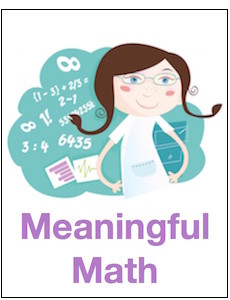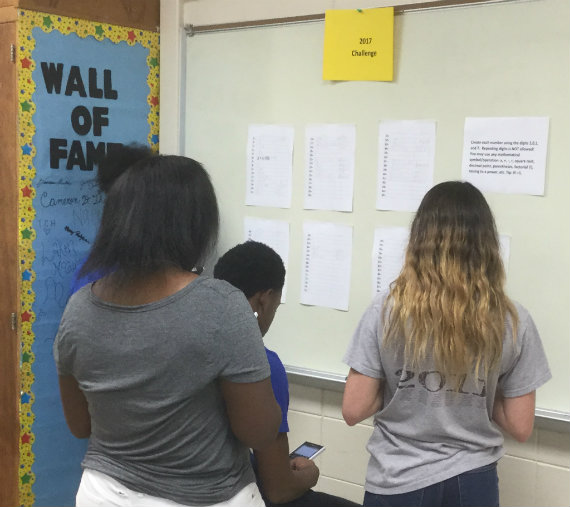How to Help Students Crush Math Anxiety
A MiddleWeb Blog

My purpose was to get to know them better and to find more common ground so that I could be a more effective teacher.
Two questions on the survey were: What is your least favorite class or activity in school and why? and Which subject is most challenging to you? Is the challenge positive or negative? My students’ answers surprised me and had me looking for answers.
Math Anxiety and Negative Feelings
Thirty-six percent of my students indicated that they had some fear, anxiety, or negative opinions or feelings about mathematics. This didn’t jump out at me at first. In fact, I read through the surveys several times before it sank in.
I think that’s because I have become desensitized to hearing that people have a math anxiety or that they don’t like math. It’s very common for a student to walk in my room and say, “I’ve never been good at math” or “I just don’t like math.”
So when I read the surveys, it didn’t make a big impression at first, even though the percentage was so large. But as it soaked in, it occurred to me that if I did nothing to help, these students would leave my classroom and enter their next math class with the same feelings of anxiety and negativity, which, in turn, would surely affect their future success.
The Cost of Math Anxiety
I then started thinking about the avenues that would be closed to my students, all the career paths that they wouldn’t be able to pursue if they were unable to feel more confident and gain some mastery of mathematics. What I could to do specifically help these students?

For the students who had math anxiety, it was interesting to see specifically which students self-identified that way. Some I would have expected, but others came as a complete surprise. Students who I would have described as above average math students stated they had some anxiety towards math.
Here are some comments from students regarding their math anxiety:
- “Math is my least favorite because i have always had trouble in math.”
- “its confusing and i don’t get it” (referring to math)
- “i’m not very good at it”
- “i have a phobia of numbers unless it’s money”
- “I end up getting formulas mixed up”
- “…I just don’t understand (math) as good as I used to”
- “I struggle remembering formulas”
- “its very difficult for me”
What can be done?
For one thing, I can be more “sensitive to past histories of frustration and failure” (Joseph M. Furner and Mary Lou Duffy). I try to be mindful that many of my students have faced years of struggle and frustration related to math.

I also let my students know that there have been many times when I struggled in classes, math classes included.
It’s also helpful to allow students to work in small groups. When I looked at the surveys, students who experienced math anxiety overwhelmingly reported that they preferred working in small groups rather than working alone. One student said, “Sometimes I don’t get what we are doing and sometimes people in the group do get it and they can help me.”
I’m fortunate my principal provided me with new desks that can be permanently arranged for cooperative learning groups so students can work together every day.
Something simple I do to reduce anxiety is use small dry-erase boards. If the students make a mistake, no problem; they can wipe it off and start fresh. It also encourages the idea that math often requires exploration and part of the process is making mistakes. (TeachHUB)
Make Math Fun: Challenges or Puzzlers
Recently I read about the “2017 Challenge” on Sarah Carter’s blog Math = Love, and I decided to try to it in my room. At the time I wasn’t trying to encourage my students who were struggling with anxiety or negativity – I just thought it looked fun.
The idea is to use the numbers in the year 2/0/1/7 (no repeating) to come up with a sum that matches each integer between 1 and 100, inclusive. Students may use any math symbol/operation, including x,+,–, ÷, square root, decimal point, parentheses, factorial, raising to a power, etc. (See the chart at Sarah’s blog post.)
The response was interesting: many of my students who are more reserved were willing to work on the challenge, even though I didn’t offer any incentives such as bonus points. I think they just enjoyed the puzzle aspect. In the future I plan to post more puzzles because I think this type of activity can be really helpful for a student struggling with math anxiety.

My students take the 2017 challenge
Reaching Students Who Just Don’t Like Math!
Some of my students just don’t like math. They expressed definite negative feelings but did not suffer any particular anxiety. Here are some of their comments:
- “I don’t understand the reasoning behind it or why it is significant”
- “I will never use the complex formulas and rules”
- “Make the lessons practical”
- “[Use] actual real world instances”
- “I really hate solving unnecessary problems”

But here’s the problem: I’m not exactly sure how. I usually begin each new unit sharing practical applications for the math we are about to study. But now I’m thinking the students want more than this. so I am committed to finding a solution, and I will continue working on this. (If you have ideas, please share them in the comments!!)
I Highly Recommend Surveying Your Students
I believe all teachers will find it worthwhile to take the time and give their students a comprehensive survey. And then commit more time to really study and reflect on the responses.
Confession: I have been guilty in the past of not taking the time to really comb through the students’ responses until patterns begin to emerge. If things don’t jump out at you first, it may require several readings for something to stick.
I hate to admit it but –, without the surveying – I would have let some of my students leave my class without at least trying to help them overcome their anxiety about math.
Resources:
► Math Anxiety: Personal, Educational, and Cognitive Consequences
► 12 Ways to Overcome Math Problem Solving & Test Anxiety in Students
► Using communication to help reduce math anxiety
► How to Deal with Math Anxiety in Students
► 5-4-3-2-1 Challenge: Another postable puzzle from Sarah Carter
► If you’d like to know more about what I put in my survey, here’s a source I used.



































Thank you for sharing! Great post on using Student Voice to understand your students and the background on why they feel like they do. Have you read Mindset by Carol Dweck? Working toward growth mindset and the power of yet was beneficial when I was in the classroom. Check it out!
Great suggestion! I have heard of the book but I haven’t read it, but I’m going to order it right now!
Jo Boaler’s book about mathematical mindset is also an excellent resource for this issue.
Also a great suggestion! I did read this book last summer and you are right it is excellent.
I just finishing reading Mathematical Mindsets by Jo Boaler and it is full of ideas. I have been following her and Carol Dweck and have really changed how I interact with students and my grandkids. Boaler’s book is specific to math which makes it important to me.
I enjoyed your post thank you for sharing. I would be very interested in the questions on your survey. Also, what is taught in your Algebraic Connections class?
Thank you! Here is a link to a survey that I used:
http://www.niu.edu/eteams/pdf_s/VALUE_StudentInterestInventory.pdf
Regarding Algebraic Connections, it is a course building on Algebra 1 and Geometry that emphasizes practical applications.
Jane Watson (University of Tasmania, Australia) talks about “critical numeracy” and using everyday newspaper stories – which may be “mis-leading, over-zealous or controversial” – to get students actively engaged in lessons and learning.
http://www.tas-education.org/numeracy/default.html
Great suggestion! Also, thanks for the link, it looks like a great resource! I looked around on the site a little bit and just randomly clicked on the article about how much time students spend on homework- it looks like a great activity! I think this is a great way to get the students invested. Thanks again!
It’s maybe more easily implemented at lower / middle grade levels, but I’ve found it to be a good way of showing kids that maths is not just about problem-solving but also about analysing and making judgements in everyday situations.
(Sorry, I meant to say in the earlier post that I was referring to your comment on how you show practical benefits.)
Kia ora! This is a very real issue, and many of my students are also in this boat. We are working hard on trying to develop ‘Growth Mindset’. This website of youcubed has been very useful. https://www.youcubed.org/
Up the top you will see ‘Week of iMath’ which offers some well thought out lessons to help inspire our kids. All the best from New Zealand!
Wow! Great resource, in particular I think some of these would be good to use at the beginning of the year when establishing classroom norms. Thank you!
The article did not touch upon the core issue, which is that Math is not a subject with some content to be memorised. It is a discipline about developing certain ways of thinking which needs understanding of concepts & processes. Memorising or mastering some processes without understanding may be easy in the lower classes. But these build a weak foundation and makes it difficult to understand higher level concepts. THis requires a radical shift in teaching math from K to 12.
Thank you for your comment! As you said, I think it’s becoming evident that students need to develop understanding as opposed to memorizing processes.
Great ideas and sharing. Building upon previous comments. Jo Boaler will be offering this summer through Stanford MOOC (Massive Open Online Class) Mathematical Mindsets
http://learn.stanford.edu/mathematical-mindsets-registration.html
I was fortunate to take her previous MOOC a couple of years ago called
“How to learn Math” I found it groundbreaking !
Her insight, and guidance, along with Carol Dweck’s growth mindset theory service as guide posts to help our students’ move past math anxiety and to show that Math is more than memorizing rules and processes as Sundaram said.
It will take time to change mindsets of students, parents and teachers.
As Jo Boaler aptly states on youcubed.org “Viva La Revolution”
Thanks for sharing the information and the link for the workshop available this summer. I have already made plans to participate, it looks great!